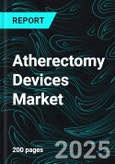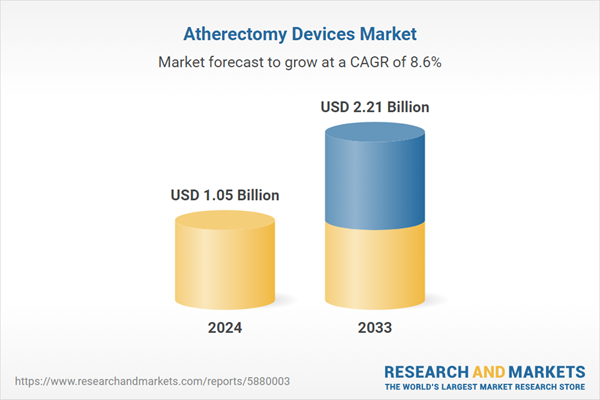Atherectomy Devices Industry Overview
Medical devices called atherectomy devices are used to remove plaque from arteries, usually in patients who have coronary artery disease (CAD) or peripheral arterial disease (PAD). By manually removing, grinding, or vaporizing the plaque, these devices help to restore blood flow and lessen symptoms like chest or leg pain. Because atherectomy techniques are less intrusive than traditional surgery and need less recovery time, they are frequently chosen. Rotational, directional, laser, and orbital atherectomy systems are among the several types of atherectomy equipment. These tools are essential for enhancing patient outcomes, especially for patients who are not suitable candidates for stent insertion or balloon angioplasty.The market for atherectomy devices is expanding due to a number of causes, including an aging population, the growing prevalence of cardiovascular illnesses, and growing awareness of less invasive procedures. Improved device designs and efficacy, among other technological developments, have increased the use of these treatments for arterial blockages. Further driving market expansion are advantageous reimbursement policies and expanding access to healthcare in developing nations. The demand for atherectomy devices as a preferred therapeutic option for the management of arterial disease is increased by these variables taken together.
Growth Drivers for the Atherectomy Devices Market
Peripheral Artery Disease (PAD) Cases Are Increasing
The market for atherectomy devices is expanding because to the rise in diabetes, obesity, and PAD patients worldwide brought on by an aging population. Eight to twelve million Americans suffer from PAD, particularly those over fifty. Of these, 6.5 million people over 40 have a PAD diagnosis. As a significant alternative in vascular procedures, atherectomy devices offer a minimally invasive method of removing arterial plaque. The gadget improves blood flow and lessens symptoms like exhaustion and leg pain. These devices assist restore arterial patency by vaporizing or physically cutting away the plaque, which greatly improves patient outcomes for those with severe cases of PAD.Technological Advancements
The market for atherectomy devices is growing significantly due to technological improvements. Device design advancements have increased their effectiveness in treating artery blockages by increasing their efficiency, accuracy, and safety. For example, improvements in orbital, laser, and rotational atherectomy technologies have improved the ability to remove plaque with the least amount of damage to vessels. By combining real-time imaging techniques like optical coherence tomography (OCT) and intravascular ultrasonography (IVUS), doctors can more easily see and navigate arterial blockages. Further driving the market's expansion are newer, easier-to-use gadgets with superior ergonomic designs that enable speedier treatments and better patient results.In Aug 2022, AngioDynamics, Inc. announced that the Auryon Atherectomy System has gained 510(k) clearance for an expanded indication that includes arterial thrombectomy.
Expansion into Emerging Markets
For atherectomy devices, entering emerging markets is a major growth driver. Advanced medical technology are becoming more and more in demand as healthcare infrastructure in places like the Middle East, Asia-Pacific, and Latin America improves. Atherectomy devices are becoming more popular as a result of growing knowledge of cardiovascular disorders and more disposable income in these places. Atherectomy procedures are also becoming more popular in these areas due to advantageous government initiatives, better healthcare legislation, and easier access to cutting-edge treatments.Challenges in the Atherectomy Devices Market
Lack of Skilled Operators
One major issue facing the market for atherectomy devices is the shortage of qualified operators. To guarantee accuracy and reduce problems, these operations call for specific training and experience. High degrees of skill are required due to the difficulty of employing various atherectomy technologies, such as rotating or laser systems. The adoption of these devices may be limited by a lack of qualified personnel, which could result in less than ideal results. Further impeding the widespread adoption of atherectomy devices, particularly in underserved areas, is the time-consuming and expensive nature of the training process.High Costs
One of the biggest obstacles to the market for atherectomy devices is their high cost, which prevents many people from using them, especially in areas with low and intermediate incomes. Healthcare providers may be discouraged from investing in these devices due to the high production and procurement costs associated with their sophisticated technology. Additionally, patients may find the procedure's cost - which includes hospital costs and gadget usage - to be unaffordable, particularly in places with less advantageous reimbursement policies. Even while atherectomy therapies are successful in controlling cardiovascular problems, access to them may be limited by this price barrier.Atherectomy Devices Market Overview by Regions
The market for atherectomy devices is growing internationally, with North America leading the way because of its sophisticated healthcare system and strong demand for minimally invasive procedures. Europe comes in second, primarily due to the rise in incidence of cardiovascular disease. The Asia-Pacific region is expanding quickly as a result of increased awareness, better access to healthcare, and economic prosperity. Due to rising healthcare spending and the need for cutting-edge medical technology, markets in Latin America and the Middle East are also expanding.United States Atherectomy Devices Market
The growing geriatric population in the United States is the main factor driving the growth of the atherectomy devices market. The predicted number of elderly Americans is 55.8 million, or 16.8% of the overall population, based on census data released in May 2023. The need for these devices is growing since atherectomy is a treatment for peripheral artery disease (PAD), which is more common in older people.Additionally, the market is expanding due to the rise in chronic conditions including PAD and atherosclerosis. High cholesterol, obesity, and diabetes all contribute to atherosclerosis, which results in artery blockages that frequently necessitate atherectomy treatments. About 25 million adults in the United States have excessive cholesterol, which raises the risk of atherosclerosis, according to a May 2024 CDC research. Since atherectomy devices provide a successful, minimally invasive therapy option for restoring blood flow and lowering problems in affected individuals, it is anticipated that the rising prevalence of cardiovascular disorders will continue to drive the demand for these devices.
Germany Atherectomy Devices Market
The growing frequency of cardiovascular disorders, especially peripheral artery disease (PAD), among the elderly population is driving growth in the German market for atherectomy devices. The adoption of atherectomy devices is being driven by Germany's well-established healthcare system as well as growing awareness of minimally invasive therapies. Favorable reimbursement rules and technological developments in device design further support market expansion. Furthermore, the demand for atherectomy treatments is supported by the increased prevalence of risk factors such as diabetes, obesity, and high cholesterol.India Atherectomy Devices Market
Due to the rising incidence of cardiovascular disorders, especially peripheral artery disease (PAD), among the vast population of India, the market for atherectomy devices is expanding significantly. The need for atherectomy treatments is being driven by an aging population and rising risk factors like obesity, diabetes, and high cholesterol. Market acceptance is also being aided by India's developing healthcare system and rising awareness of minimally invasive procedures. In the upcoming years, the market is anticipated to grow even more due to favorable government regulations, expanding access to healthcare, and technological advancements in atherectomy devices.Saudi Arabia Atherectomy Devices Market
The market for atherectomy devices is expanding in Saudi Arabia as a result of an aging population and an increase in cardiovascular disorders, particularly peripheral artery disease (PAD). Demand is being driven by improvements in healthcare access, atherectomy technology breakthroughs, and increased awareness of minimally invasive procedures. The healthcare system in Saudi Arabia is also making investments in cutting-edge medical technology, which encourages the use of atherectomy tools for the efficient treatment of arterial blockages.Atherectomy Devices Market Segment
Product Type
- Directional
- Rotational
- Orbital
- Laser
Application
- Cardiovascular
- Neurovascular
- Peripheral Vascular
End User
- Hospitals
- Ambulatory Care Service
- Medical Research Institutes
Countries
North America
- United States
- Canada
Europe
- France
- Germany
- Italy
- Spain
- United Kingdom
- Belgium
- Netherlands
- Turkey
Asia-Pacific
- China
- Japan
- India
- South Korea
- Thailand
- Malaysia
- Indonesia
- Australia
- New Zealand
Latin America
- Brazil
- Mexico
- Argentina
Middle East & Africa
- Saudi Arabia
- UAE
- South Africa
Rest of the World
The key players have been analyzed by:
- Overview
- Key Persons
- Product Portfolio
- Recent Development & Strategies
- Revenue Analysis
- Boston Scientific Corporation, Inc.
- Abbott Laboratories
- Medtronic plc
- Cardinal Health
- Terumo Corporation
- Integer Holdings Corporation
- Becton, Dickinson and Company
- AngioDynamics Inc.
Table of Contents
Companies Mentioned
- Boston Scientific Corporation, Inc.
- Abbott Laboratories
- Medtronic plc
- Cardinal Health
- Terumo Corporation
- Integer Holdings Corporation
- Becton, Dickinson and Company
- AngioDynamics Inc.
Methodology
In this report, for analyzing the future trends for the studied market during the forecast period, the publisher has incorporated rigorous statistical and econometric methods, further scrutinized by secondary, primary sources and by in-house experts, supported through their extensive data intelligence repository. The market is studied holistically from both demand and supply-side perspectives. This is carried out to analyze both end-user and producer behavior patterns, in the review period, which affects price, demand and consumption trends. As the study demands to analyze the long-term nature of the market, the identification of factors influencing the market is based on the fundamentality of the study market.
Through secondary and primary researches, which largely include interviews with industry participants, reliable statistics, and regional intelligence, are identified and are transformed to quantitative data through data extraction, and further applied for inferential purposes. The publisher's in-house industry experts play an instrumental role in designing analytic tools and models, tailored to the requirements of a particular industry segment. These analytical tools and models sanitize the data & statistics and enhance the accuracy of their recommendations and advice.
Primary Research
The primary purpose of this phase is to extract qualitative information regarding the market from the key industry leaders. The primary research efforts include reaching out to participants through mail, tele-conversations, referrals, professional networks, and face-to-face interactions. The publisher also established professional corporate relations with various companies that allow us greater flexibility for reaching out to industry participants and commentators for interviews and discussions, fulfilling the following functions:
- Validates and improves the data quality and strengthens research proceeds
- Further develop the analyst team’s market understanding and expertise
- Supplies authentic information about market size, share, growth, and forecast
The researcher's primary research interview and discussion panels are typically composed of the most experienced industry members. These participants include, however, are not limited to:
- Chief executives and VPs of leading corporations specific to the industry
- Product and sales managers or country heads; channel partners and top level distributors; banking, investment, and valuation experts
- Key opinion leaders (KOLs)
Secondary Research
The publisher refers to a broad array of industry sources for their secondary research, which typically includes, however, is not limited to:
- Company SEC filings, annual reports, company websites, broker & financial reports, and investor presentations for competitive scenario and shape of the industry
- Patent and regulatory databases for understanding of technical & legal developments
- Scientific and technical writings for product information and related preemptions
- Regional government and statistical databases for macro analysis
- Authentic new articles, webcasts, and other related releases for market evaluation
- Internal and external proprietary databases, key market indicators, and relevant press releases for market estimates and forecasts

LOADING...
Table Information
| Report Attribute | Details |
|---|---|
| No. of Pages | 200 |
| Published | May 2025 |
| Forecast Period | 2024 - 2033 |
| Estimated Market Value ( USD | $ 1.05 Billion |
| Forecasted Market Value ( USD | $ 2.21 Billion |
| Compound Annual Growth Rate | 8.6% |
| Regions Covered | Global |
| No. of Companies Mentioned | 8 |









